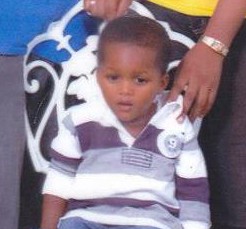The Guyana Court of Appeal yesterday commenced hearing arguments in the appeal brought by Rawle Samuels of the life sentence imposed upon him for the killing of four-year-old Jamal Nedd, whom he knifed to death at Buck Hill, Linden, in 2013.
Samuels, who is hoping to have his sentence reduced, is contending that it is “manifestly excessive.”
The state, on the other hand, is arguing that having regard to all the circumstances of the case, the sentence imposed by trial judge Justice Nareshwar Harnanan was fair.
On July 18th of last year, Samuels, who had been indicted for murder, pleaded guilty to the lesser offence of manslaughter, accepting that on February 6th, 2013, he unlawfully killed the toddler.

Responding to questions from Justice of Appeal Rafiq Khan, defence attorney Stanley Moore, who is representing the appellant, offered 20 years as being a “suitable sentence” for his client to serve.
Advancing the life expectancy for male Guyanese is generally 65 years, counsel said that after making the deductions, which Justice Harnanan would have made when he handed down the sentence, 20 years would be appropriate.
He told the judge when further questioned that it would be 20 calendar years, from which deductions would be further made for what constitutes one prison-year.
Meanwhile, asked by acting Chancellor Yonette Cummings-Edwards if a sentence of 30 years would be considered manifestly excessive, Moore said that what is manifestly excessive is the sentence of life imprisonment.
In imposing the sentence, Justice Harnanan had said that the convict was not to be eligible for parole until after serving 30 full calendar years behind bars.
Meanwhile, to Prosecutor Natasha Backer’s argument that the judge’s sentence was fair, Justice Arif Bulkan enquired whether in the context of the convict having thrown himself at the mercy of the court, the sentence could be so considered.
According to state counsel, it can, given the circumstances of the case.
It was at this point that Justice Bulkan questioned whether considerations could not be made for the appellant’s remorse, while noting the possibility of persons being amenable to change.
All three judges also highlighted that there had been no rationale offered by the trial judge as to why he may have commenced at the extreme.
Conceding that no such reasons were given, Backer impressed upon the court to examine the existing aggravating circumstances of the offence with which Justice Harnanan would have been confronted, while noting that he did make deductions for Samuels’ remorse.
Backer argued that there being no mitigating circumstances of the “offence,” the judge would have started at the maximum of life imprisonment.
However, whatever deductions were made, she said, were the result of the mitigating factors related to the “offender.”
In those circumstances, she further said, it is the state’s view that the sentence of life imprisonment was fair.
After hearing arguments on both sides, the court announced that notices will be sent out for decision.
In justifying his sentence, Justice Harnanan had asserted that the court could not lose sight of the fact that violence was used against a child, as a result of which his life was snuffed out. For that, he said, Samuels had to be dealt with “condignly.”
It was the state’s case that on the day in question, Samuels, armed with a knife, was pursuing Jamal’s aunt, after an altercation he had with her.
As the woman was fleeing him, the toddler, who had just arrived home from school and saw what was transpiring, repeatedly encouraged her to, “run, aunty.”
In the prosecution’s facts, which Samuels did not deny, it was at this point that the man turned his weapon on Jamal, who was stabbed multiple times about his body.
The convict had by this time picked up the young boy and thrown him back into his aunt’s yard, where he repeatedly plunged a knife, with a blade 17 cm long and with a width of 4 cm, into his body, including into his back, where he left it stuck.
The court had been told that by the time the child was rushed to the Mackenzie Hospital Complex, he was gasping for breath from the knife left in him, which was protruding from his chest.
In a report, the probation officer said Samuels accepted total responsibility for his actions and expressed remorse, while stating that he did not know what he was doing at the time.
In his address to the court prior to being sentenced, Samuels had said that he was sorry for his actions.
Before imposing his sentence, Justice Harnanan had said he had considered both the mitigating and aggravating circumstances of the case.
The judge noted that Samuels had no antecedents and had pleaded guilty at the first given opportunity, saving the court considerable time, in otherwise having to conduct a trial.
Listing the aggravating factors, however, the judge noted the callous manner in which the child’s life was brutally snatched from him.
The judge pointed out that the defenceless four-year-old, about three feet tall, posed no threat to or in no way provoked Samuels into doing what he did.
Referencing the autopsy report, Justice Harnanan, noted that Jamal sustained five incised wounds, which ultimately caused his death.
There was a gaping incised wound to his right leg, one to the middle of his inner left thigh, one to the left and right sides of his back and the other to the left side of his chest.
Owing to the serious and heinous nature of the crime committed, the judge announced to Samuels, who cried uncontrollably, that his sentence would be life in prison.
The judge started at a base of 45 years to be spent behind bars before Samuels would be eligible for parole but deducted four years for the time he has been awaiting trial, six years for his guilty plea, and five years for good prison behaviour revealed by the probation report. This brought the total to 30 years to be served before parole.








